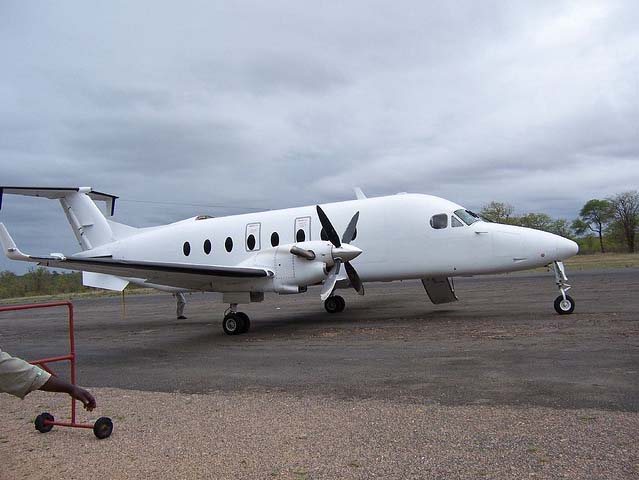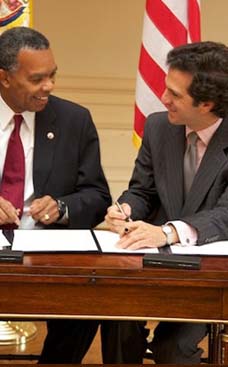
Miller created the Airborne Lifeline Foundation in 2006 after establishing the infrastructure -- planes, pilots, doctors and remote area clinics -- to support the operation. The foundation signed a cooperative agreement with the U.S. Ministry of Health. "But we had no idea how we were going to fund it," Miller said. He and his wife had just put their farm under an environmental easement, he said. The couple sold the resulting tax credits, essentially mortgaging their home to get the first Airborne Lifeline Foundation planes in the air. "We started flying in April 2007," Miller said. The eight-person planes were leased from a company in Botswana with "great safety records," Miller said. The planes transported medical supplies and doctors based in Botswana's capital, as well as a pediatric HIV/AIDS specialist from the Baylor College of Medicine and an HIV/AIDS specialist from the University of Pennsylvania School of Medicine, to remote areas of the country. There, the doctors were greeted by people who had never received treatment for HIV or tuberculosis and had walked for hours or even days to see the specialists. Miller described the operation as a "glorified bus service" -- the foundation pays only for planes, pilots and fuel. It is a simple but critical solution based on consistency and reliability. "It's taking the same doctor to the same village on the same day," Miller said. "I always think of the mother with the baby who wants to know that the pediatrician is going to be there."
Former Botswana Country Director Johnathan Miller mortgaged his 30-acre farm in Leesburg to fund the launch of the Airborne Lifeline Foundation
Flying to the aid of Africans fighting illness
By Caitlin Gibson
Washington Post Staff Writer
Thursday, August 26, 2010
Caption: Beechcraft airplane we rode to Ngala Game Reserve by System92 Flickr Creative Commons Attribution-NonCommercial-NoDerivs 2.0 Generic
Three years ago, the first flights of the Airborne Lifeline Foundation took off, transporting medical specialists and supplies via commuter planes to remote corners of Botswana to help villages combat HIV/AIDS and tuberculosis. This week, Johnathan Miller -- a Loudoun County resident who mortgaged his 30-acre farm in Leesburg to fund the launch of the organization -- is back in Africa to discuss expanding the foundation's operations into Tanzania.
Two days before leaving for Botswana, Miller, 57, sat on the porch of the farm he owns with his wife, Elizabeth Thompson, and recounted how it all started. While working at an international consulting firm in 2004, Miller was approached by a client who was looking to dispose of hundreds of unwanted, turbo-prop commuter planes. That's when Miller said he first thought of using the planes to transport medical personnel and supplies to remote regions in Africa.
Unfortunately, the idea didn't progress fast enough for Miller's client.
"They wanted to move the planes quickly," he said. "In Africa . . . it takes a lot of time."
But the seed had been planted.
Miller focused on Botswana first because he was familiar with the country, having served as a Peace Corps director there in 1983, one of a multitude of professional identities that Miller has had in the past few decades.
Miller started his career as a lawyer in his native Kentucky, then became senior director of the National Security Council and deputy political director to President George H.W. Bush, which was followed by his Peace Corps post. He has also been a horse breeder, beer brewer, president of the Thoroughbred Retirement Foundation and president of an international consulting firm.
Determined to get his idea off the ground, Miller approached the health minister of Botswana, who supported Miller's plan. The country had one of the highest rates of HIV/AIDS in Africa, and with a population spread across vast areas and in remote regions, treatment was a challenge, Miller said. Despite skepticism from the Centers for Disease Control and Prevention, Miller reached out to health-care providers, determined to succeed.
"I became somewhat obsessed with getting this done, because I'd been told it couldn't be done," he said.
Miller created the Airborne Lifeline Foundation in 2006 after establishing the infrastructure -- planes, pilots, doctors and remote area clinics -- to support the operation. The foundation signed a cooperative agreement with the U.S. Ministry of Health.
"But we had no idea how we were going to fund it," Miller said.
He and his wife had just put their farm under an environmental easement, he said. The couple sold the resulting tax credits, essentially mortgaging their home to get the first Airborne Lifeline Foundation planes in the air.
"We started flying in April 2007," Miller said.
The eight-person planes were leased from a company in Botswana with "great safety records," Miller said. The planes transported medical supplies and doctors based in Botswana's capital, as well as a pediatric HIV/AIDS specialist from the Baylor College of Medicine and an HIV/AIDS specialist from the University of Pennsylvania School of Medicine, to remote areas of the country. There, the doctors were greeted by people who had never received treatment for HIV or tuberculosis and had walked for hours or even days to see the specialists.
Miller described the operation as a "glorified bus service" -- the foundation pays only for planes, pilots and fuel. It is a simple but critical solution based on consistency and reliability. "It's taking the same doctor to the same village on the same day," Miller said. "I always think of the mother with the baby who wants to know that the pediatrician is going to be there."
Five flights service three locations regularly each month. "Unless the weather makes it unsafe, we've got people that are planning to come in from the bush to the clinic," Miller said. "They are expecting to see that doctor. We've got to be there."
When the initial funds started to run low -- and Miller contemplated liquidating his 401K to keep the flights going -- donations from former secretary of state James Baker and the Merck Foundation came through. Those donations were followed in 2008 by the foundation's first President's Emergency Plan For AIDS Relief grant, for $350,000. The grant was repeated last year for $332,000 and again this year for $456,000. As the foundation grew in reputation, support from private and corporate donors increased, as well. Still, the foundation is "lean and mean," Miller said, and 100 percent of its funding goes to supporting the operation. Miller acknowledged that salaried employees will become a necessity if the program continues to expand as planned.
ad_icon
Miller plans to meet this week with representatives from Baylor University, the University of Pennsylvania, the Botswana Ministry of Health and the Centers for Disease Control and Prevention to discuss the expansion of the foundation's services. Having seen the impact of the regular preventative care and the training that the specialists provide to local doctors, Miller said, he is inspired to bring the organization's model to other places, in Africa and beyond.
"This gentleman's blood count on HIV/AIDS dropped considerably just in the two months that we had been flying into his village," Miller said. "Those stories are repeated again and again . . . you see dramatic changes in terms of the health of the people."
As early as September, Miller said, he hopes to add two more remote locations to the rotation in Botswana, increasing the number of flights per month from five to nine. Starting early next year, the organization plans to start flying doctors to Baylor-affiliated clinics in Tanzania.
"You have to take baby steps," Miller said. "We're just beginning."













